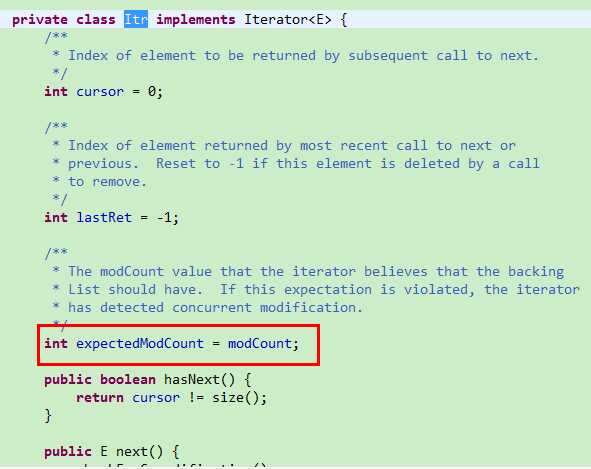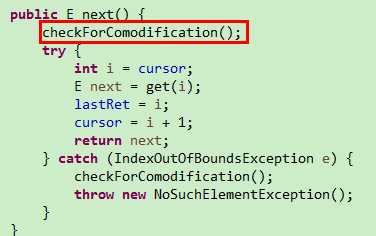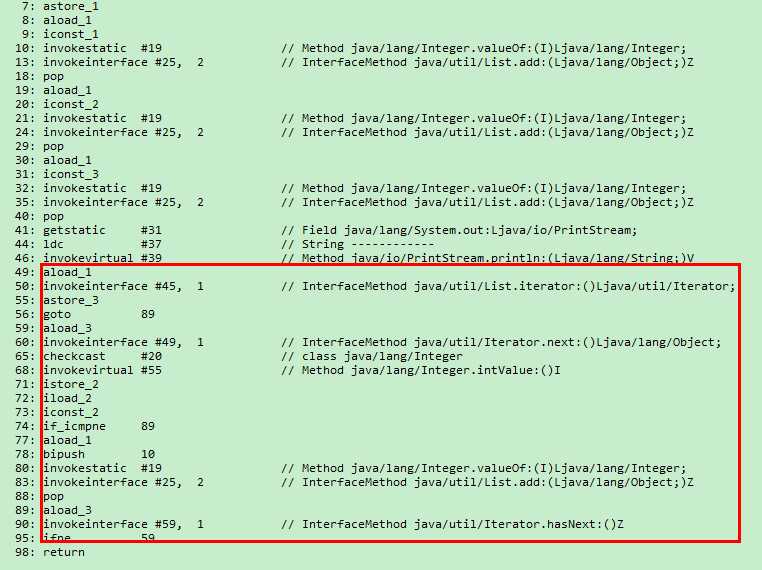1)介绍
并发修改ConcurrentModificationException错误是开发中一个常见错误,多发生在对一个Collection边遍历边做影响size变化的操作中,下面以ArrayList为例分析ConcurrentModificationException错误。
2)分析
ArrayList初始数据如下:
1 List<Integer> list = new ArrayList<Integer>(); 2 list.add(1); 3 list.add(2); 4 list.add(3);
【场景1】不会有并发修改错误
1 int length = list.size(); 2 for (int i = 0; i < length; i++) { 3 if (list.get(i).equals(2)) { 4 list.add(10); 5 } 6 }
【场景2】会有并发修改错误
1 for(int temp : list) { 2 if(temp == 2) { 3 list.add(10); 4 } 5 }
【场景3】会有并发修改错误
1 Iterator<Integer> iterator = list.iterator(); 2 while(iterator.hasNext()) { 3 if(iterator.next().equals(2)) { 4 list.add(10); 5 } 6 }
【场景4】没有并发修改问题
1 ListIterator<Integer> listIterator = list.listIterator(); 2 while (listIterator.hasNext()) { 3 if (listIterator.next().equals(2)) { 4 listIterator.add(10); 5 } 6 }
【分析】
其实ConcurrentModificationException异常的抛出是由于checkForComodification(AbstractList类中)方法的调用引起的。
1 private void checkForComodification() { 2 if (this.modCount != l.modCount) 3 throw new ConcurrentModificationException(); 4 }
而checkForComodification方法的调用发生在Iterator相关api方法中,在调用list的iterator方法会创建一个Itr对象。

在创建会与AbstractList的modCount赋予相同的值, 而在Itr的next方法中会调用checkForComodification

在场景3中,list.add操作更改modCount的值,所以会有并发修改错误,而场景1中并没有使用iterator相关api,add操作虽然修改了modCount但是不会检查modCount所以没有并发修改错误。
场景4中,ListItr类add方法
1 public void add(E e) { 2 checkForComodification(); 3 try { 4 int i = cursor; 5 ArrayList.this.add(i, e); 6 cursor = i + 1; 7 lastRet = -1; 8 expectedModCount = modCount; 9 } catch (IndexOutOfBoundsException ex) { 10 throw new ConcurrentModificationException(); 11 } 12 }
其中8行:在调用了list.add操作之后,将ListItr中的expectedModCount与AbstractList中的modCount进行了同步,所以在下次调用next也就不会抛出异常了,此时假如以后不调用next或者又重新创建了 ListItr也不会有异常抛出。
最后场景2并没有使用Iterator中的api为什么也抛出了异常了。其实编译器会将for-each循环代码编译为Iterator相关api的调用。为了便于查看编译后的代码这里添加一个“———-”打印。
1 List<Integer> list = new ArrayList<Integer>(); 2 list.add(1); 3 list.add(2); 4 list.add(3); 5 System.out.println("------------"); 6 for (int temp : list) { 7 if (temp == 2) { 8 list.add(10); 9 } 10 }
编译后的字节码为:

所以场景2和场景3是一样的,也会抛出异常了。
